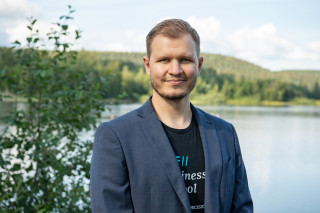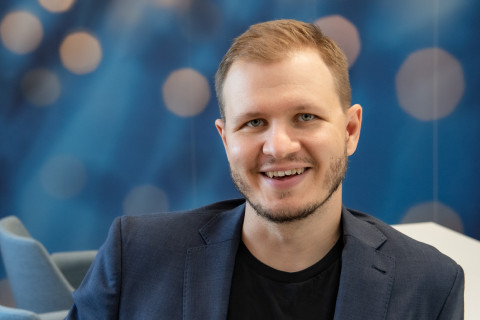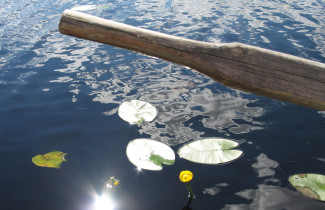As a young boy, Juho Pesonen would show professors of tourism around his hometown, Savonlinna. This August, he, too, joined the ranks of tourism professors, and is now working as Professor of Tourism Business at the University of Eastern Finland.
Although the coronavirus pandemic has made the life of tourists an uncertain one, travel plans are once again being made. To travel to a metropolis or to a sunny beach: that is the question. After the pandemic subsides, where would a tourism researcher like to travel?
“I really have no burning desire to travel. Before the pandemic, I had to travel for work so much that it's been nice to stay home with my family. Spending the summer in Finland is a must for me,” says Juho Pesonen, the University of Eastern Finland’s newly appointed Professor of Tourism Business.
This summer, Pesonen and his family have travelled in the nearby areas and visited friends and relatives in the Savo and North Karelia regions. When planning their travel destinations, the family relies on the father’s expertise.
“As a tourism researcher, it is impossible for me to distance myself from my work. Especially when planning a trip, I analyse my own decisions: why have I chosen a certain destination, and where do I want to go? I look very closely at digital services, for example, how good or bad the website of a tourism company is. But when I finally get to the destination, I can let go and relax,” Pesonen says.
Tourism-wise, the summer of 2021 seems to be similar to the previous, pandemic summer: domestic tourism is more popular than ever before, and hotels and other accommodation alternatives have been sold out in many places.
“The pandemic continues to have a significant impact on tourism, but it is difficult to foresee the future. At the moment, it is impossible to say whether next summer will be the record summer of domestic tourism, or the worst summer it’s ever had. Both extremes are possible. We’ve seen in the US that tourism bounces back quickly when it is safe and possible. If there are no new variants and vaccination rounds, Finns will be heading abroad next summer. For a researcher, the situation is interesting.”
Tourism researcher follows his mother’s footsteps
Juho Pesonen started as Professor of Tourism Business at the Business School of the University of Eastern Finland in the beginning of August. Sometimes academic interests run in the family, and that's the case with Pesonen, too.
“My mother worked in the Finnish University Network for Tourism Studies for a long time. As a young boy, I would show visiting professors of tourism around our hometown Savonlinna.”
On his path to a professorship, Pesonen has stayed very loyal to one university: he obtained his Master’s degree in economics and business administration from the University of Joensuu in 2009, a PhD in economics and business administration from the University of Eastern Finland in 2013. Before his professorship, he worked as Research Manager for Digital Tourism Business, all in the same university.
Pesonen became interested in tourism research during his Master’s level studies, when he worked as a research assistant in the Centre for Tourism Studies on the Savonlinna Campus. Today, he is a member of the Research Group for Tourism Business, led by Professor of Marketing Raija Komppula.
“I have always regarded tourism as an extremely interesting sector. It has many special features, such as the role of destinations and a seasonal nature. In few sectors it is as important to get inside the traveller's head. Tourism is also a reflection of a modern society: what happens in tourism is an indication of what is going on in society.”
Tourism is a reflection of a modern society: what happens in tourism is an indication of what is going on in society.
Juho Pesonen
Professor of Tourism Business

Tourism on terms of competitiveness or restrictions?
Tourism researchers see the societal significance of tourism from very different perspectives, and the coronavirus pandemic has led to divergent views. Some researchers stress the importance of tourism for society’s competitiveness and economy, while some more critical researchers would like to restrict mass tourism and stop air travel.
“It is difficult to find a middle path, and this speaks to the complexity of the whole phenomenon,” Pesonen says.
Pesonen’s professorship is a combination of business studies and social sciences. The focus is on generating knowledge that will help in the transition to a more sustainable society.
“Sustainability is based on the idea that future generations should have the same or even better opportunities than us. It is sad that our present well-being is dependent on the destruction of nature, and yet as consumers we don’t want to let go of the things we have and are used to. The pain of giving something up is great, and it creates a lot of problems. One of the biggest issues in tourism revolves around equality and fairness.”
Business is an important driver in the transition to a sustainable society. Methods of futures studies are therefore needed to see where tourism business is headed. Pesonen also emphasises the role of technology in building the future.
“We already have all the technology needed, together with a change in our behaviour, to create societal sustainability on a global scale. The question is how to start using that technology without sacrificing too much of our well-being.”
Research-based knowledge is needed for leading the way in tourism
Besides working as a researcher and educator, Pesonen has also worked as a consultant for tourism companies. His experience is that tourism companies should forget gut feeling and start leading with knowledge. At the moment, research-based knowledge doesn’t really find its way to the everyday life of companies.
“It is rare to see a field where practice and research are so far apart. Tourism researchers are doing their own thing and reporting on what is happening in the field. Unfortunately, what researchers do has very little impact on the decisions made by tourism companies. In other fields, experimental research settings are common, but they are very rare in tourism. Surveys are widely used in tourism, but they are challenging when the goal is to obtain information that is relevant to companies’ decision-making. Companies, on the other hand, have little contact with higher education institutions. It takes a lot of work from us academic researchers to stay in contact with companies and to influence the channels where companies operate and are present,” Pesonen says.
According to Pesonen, the best way to bring research-based knowledge into companies is through education: he has been the director of, and a teacher in, the international Master's Degree Programme in Tourism Marketing and Management since 2017.
“Having the skills and courage to rethink is the most important thing needed. Students are thirsty for new knowledge and, after graduation, they go on to work in different companies and organisations in the tourism sector. I just read on LinkedIn that a student who graduated from us last year will start coordinating a major sustainable tourism project in the Uusimaa region here in Finland. At the moment, there is a need for people who are competent in the development of tourism business, and many of our graduates have managed to secure these roles.”
Juho Pesonen
- Professor of Tourism Business, University of Eastern Finland, 1 August 2021–
- Doctor of Economics and Business Administration, University of Eastern Finland, 2013.
- Title of Docent in Digital Marketing, Especially Tourism Services, University of Turku, 2019.
Key roles
- Research Manager for Digital Tourism Business, University of Eastern Finland, 2014–2021.
- Director of the international Master’s Degree Programme in Tourism Marketing and Management, University of Eastern Finland, 2017–
- Coordinator, Centre for Tourism Studies, University of Eastern Finland, 2009–2014.
For further information, please contact:
Juho Pesonen, Professor, Business School, University of Eastern Finland, [email protected], tel. +358 40 184 2698



